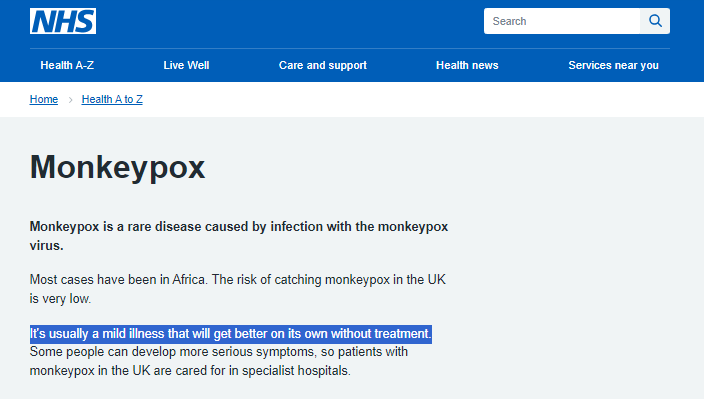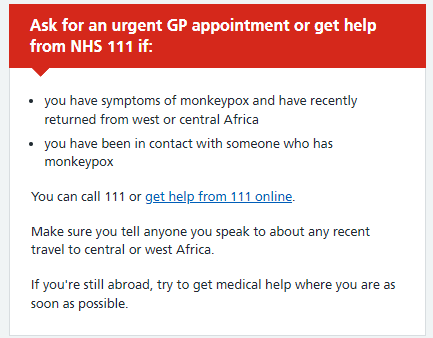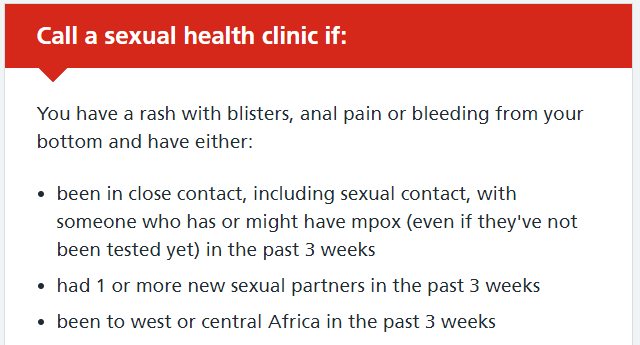Monkeys were increasingly getting offended about a disease named after them, so we must now call it Mpox. Even though the monkeys happily went about their daily lives with humans naming a disease after them, since the 1970s, in 2022 the WHO decided enough was enough.
Around the same time, the fear-mongering around Mpox began ramping up.
Take for example how the National Health Service (NHS) changed its Monkeypox/Mpox information page.
In 2019, when we still lived in a relatively sane world, the NHS told us that Monkeypox is “usually a mild illness that will get better on its own without treatment. Some people can develop more serious symptoms, so patients with monkeypox in the UK are cared for in specialist hospitals”.
Fast-forward to May 2022 and suddenly this paragraph was removed.
However, it did still tell us that “it’s very uncommon to get monkeypox from a person with the infection because it does not spread easily between people.
Around this time, the NHS also added the advice to ask for an urgent GP appointment if “you have been in contact with someone who has monkeypox”.
By June, the “it’s very uncommon to get monkeypox” wording had been removed.
Now, in 2024, the Mpox hysteria is ramping up again. This time you should be concerned if you have “had 1 or more new sexual partners in the past 3 weeks”.
Furthermore, following the successes with Covid rules, you must isolate if you’re diagnosed with it. Even if your symptoms are mild, which probably means if you are asymptomatic but a test says you are ill.
Even within the last week, the UK Health Security Agency has changed its advice from “the illness is usually mild” to “Non-HCID mpox is usually mild”.
Here HCID stands for High Consequence Infectious Disease, suggesting that they are about to tell people that HCID Mpox is not mild and most won’t recover within a few weeks without treatment (or most likely vaccines).
Similarly to how the definition of the word “vaccine” changed during Covid, the wording around the seriousness of Monkeypox/Mpox is gradually evolving. Within a few short years, a rare disease that is usually mild is changing to a more serious disease that needs vaccines and self-isolation. Is the disease itself evolving (naturally or through Gain of Function experiments) or has a whole industry developed which thrives on and encourages fear-mongering, in order to sell treatments and vaccines?











From my take on the (ridiculous) subject:
It’s bad, you guys. From roughly this time last year, cases are up one hundred and sixty terrifying percent, and deaths are up nineteen oh-my-god-we’re-all-gonna-perish percent.
To put those perilous percentages into perspective, this year’s death total for mpox around the entire planet (the overwhelming majority of which have occurred in Africa) is… 524.
Five hundred and twenty-four.
I hope I don’t need to say it, but I will: Every death is a tragic one. [Please observe a solemn and sincere moment of silence for the dearly departed.] But compare the novel marsupialpox to, say, obesity—which kills 4.72 million people around the globe annually—or starvation— which causes 9 million heartbreaking deaths—or tuberculosis—which sends 1.3 million souls to the afterlife every year—or even anemia (low iron)—which snuffs out 6,021 lives in the US alone every twelve months—and it certainly makes one wonder what criteria the WHO is using to define an “emergency.”
https://jennasside.rocks/p/monkey-see-monkey-do
I don’t think anyone is getting real worked up over this (or avian flu) - they really overplayed the ol’ COVID scamdemic hand, & globally everyone is still feeling the economic & all other aspects of that (including distrust & derision of our “public health” entities & “experts”)